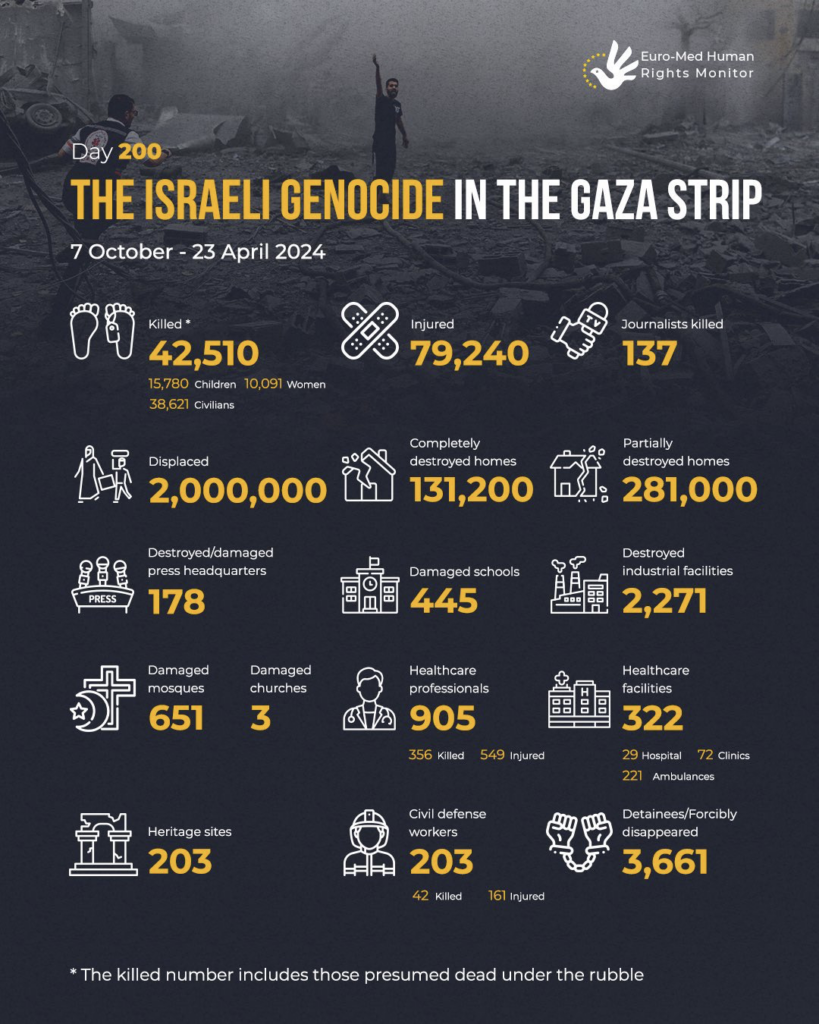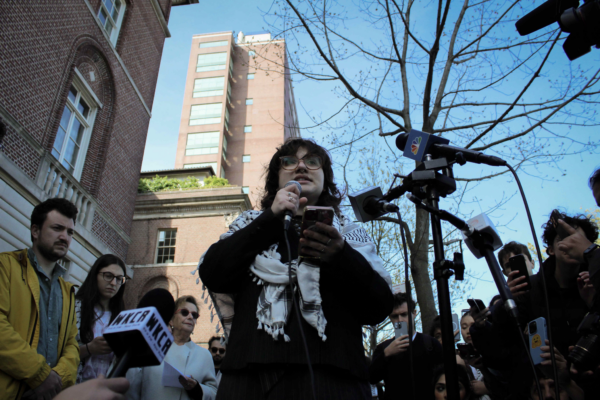Students at the press conference reiterated their demands for the University and spoke to how their Jewish heritage informs their decisions to stand in solidarity with Gaza.By Gaby Diaz / Staff Photographer
The students were arrested after University President Minouche Shafik’s Thursday authorization of the NYPD to sweep the “Gaza Solidarity Encampment.”
By: BY MANUELA SILVA AND MIRANDA LU
A group of Jewish Barnard and Columbia students detained during Thursday’s New York Police Department sweep of the “Gaza Solidarity Encampment” held a press conference on Tuesday to restate their demands for the University and speak on how their Jewish heritage informs their decisions to stand in solidarity with Gaza.
The press conference took place in front of the President’s House on 60 Morningside Drive as the “Gaza Solidarity Encampment” neared its one-week mark.
Detained Jewish Columbia students held a press conference on Tuesday in front of the President’s House to restate their demands for the University and speak to how their Jewish heritage informs their decisions to stand in solidarity with Gaza. https://t.co/YWnLEbdlX4
— Columbia Daily Spectator (@ColumbiaSpec) April 25, 2024
Sarah, a Columbia student who is participating in the encampment, began the conference by highlighting the ongoing situation in Gaza.
“Right now, Israel is literally starving millions of Palestinians in Gaza, killing children, bombing homes, hospitals, and universities, where there are thousands of young students just like us,” Sarah said. “We are here today as Jewish Columbia and Barnard students who were arrested and suspended for peacefully protesting in support of Palestine.”
They then reiterated CUAD’s three demands of the University, which include financial divestment from all companies that “profit from Israeli apartheid, genocide, and occupation in Palestine”; financial transparency of all of the University’s investments; and “amnesty for all students and faculty arrested or fired in connection to the movement for Palestinian liberation.”
Three Barnard students, all members of Columbia University Apartheid Divest who were detained on Thursday, spoke on how their Jewish identities led them to participate in pro-Palestinian demonstrations on campus. Marianne Hirsch, professor of English and comparative literature at Columbia and member of the American Association of University Professors, spoke after the students gave their remarks.
Soph Askanase, BC ’25, who was detained and suspended on Thursday, was the first student to speak. Askanase said they could not “stand to be complicit in our University’s ongoing support for Israel’s genocidal campaign,” highlighting that “there are no universities left in Palestine.”
Askanase also said that their bat mitzvah speech about God giving the Ten Commandments on Mount Sinai in part inspired their solidarity with the Palestinian people.
“I ask this to each and every one of you—will you hear our message of solidarity as we enter the 200th day?” Askanase asked.
After briefly describing their experience in the encampment as one of reading passages, eating meals with friends, and spending time with the community, Askanase said that many members of communities they are a part of outside of the encampment have also come to vilify them. They called on elected officials to come see the encampment and read the community guidelines, which include a commitment to “remain grounded in why we enter the space—as an act of solidarity with the Palestinian people,” not engage with counterprotesters, assume best intentions, and not share names of those in the encampment.
For Sarah Borus, a student at Barnard, the “Gaza Solidarity Encampment” reflects the Jewish tradition she was raised with.
“[My father] and my mother made sure that I knew being Jewish meant to join together with other oppressed people, because only collective liberation will keep us safe,” Borus said. “That lesson of solidarity always extended with solidarity with the people of Palestine. The ‘Gaza Solidarity Encampment’ is a reflection of the Jewish tradition of togetherness and liberation.”
The students described their experience reckoning with the backlash they received from their community for participating in the pro-Palestinian protests. Askanase said that they had been called “disgraces,” “self-hating,” and “neurotic.” Both Borus and Lea, another Barnard student, saw the struggles of Palestinian people as intertwined with their own family history of living under oppression.
“Witnessing the trauma of Palestinians is excruciating, especially when recognizing how our own families have been complicit in perpetuating a distorted narrative and revisionist history whereby Palestinians are made to be our aggressors, because they have been subjugated to the same repression that our Jewish ancestors have been for generations,” Lea said. “There’s so much deep-seated rage in Jewish community, but we cannot allow the slaughter of another people as a result of this generational trauma.”
Hirsch then introduced herself, stating that as a faculty member who specializes in Holocaust studies and the daughter of a Holocaust survivor, she was “extremely distressed” to see that antisemitism is being “weaponized and misused under the guise of safety and security” with the intent of “shutting down academic freedom.” Hirsch then read the declaration adopted by the Barnard and Columbia chapter of AAUP on Friday and stressed the importance of remembering that the protests are not directed against “an identity, which is Jewishness, or a faith,” but rather are part of a movement that “criticizes the State of Israel.”
“We are a very multicultural, diverse community, and each of the identity categories that we have here is in itself diverse,” Hirsch said. “Weaponizing antisemitism in this way, singling out only certain Jewish students who are expressing fear, fear that’s being amplified and being promoted from the outside, is not making Jewish students or faculty or Jews in this country safe. On the
contrary, it is promoting further division and probably further antisemitism.”
After the speeches, Hirsch and the students took questions from reporters. Askanase responded to a question regarding a message sent earlier this week by Rabbi Elie Buechler, director of the Orthodox Union-Jewish Learning Initiative on Campus at Columbia/Barnard, advising Jewish students to return home amid reports of “extreme antisemitism” on and around campus.
The students emphasized the importance of making a distinction between “being uncomfortable” and “being unsafe.” Askanase stated that they felt unsafe when they and their friends were “sprayed with a noxious chemical” during a pro-Palestinian protest in January and were subsequently hospitalized, and when Shai Davidai, an assistant professor at the Business School, addressed them with racial slurs and attempted to enter the campus on Monday.
“I empathize with individuals who are uncomfortable with certain rhetoric, but I remind you that we live in a country and attend a university that extremely values free speech, open dialogue, and rhetoric,” Askanase said. “I encourage everyone to listen to a variety of perspectives and to analyze what it means to not like something or disagree with something versus to actively be in a position of being unsafe.”
Near the end of the conference, a reporter asked about the risks Palestinian and other international students take in speaking out. Mahmoud Khalil, a Palestinian graduate student at Columbia on the CUAD negotiating team, shared that he is attending the University on an F-1 visa and that he chose not participate in any protests out of fear of deportation. He said that he did not feel safe for the past six months as a “direct result” of the University’s “one-sided statements and inaction.”
“What we’re facing here is anti-Palestinian hate that’s taking multiple forms, whether it is Islamophobia, racism, antisemitism,” Khalil said. “Yet Columbia has not acknowledged this pain, the pain of the Palestinian community at Columbia that are calling for the end of the genocide in Gaza.”
The students all emphasized the need for centering the Palestinian people amid the ongoing protests.

“We have continually had to defend our religious identities, even when there’s a long tradition behind them,” Borus said. “We stand here before you to say, clearly, that this is a distraction. More than 34,000 Palestinians are dead, and 85 percent of the population of Gaza is displaced. Our University profits off of this genocide, and as Jews, we will continue to fight until Columbia divests.”


Leave a Reply
You must be logged in to post a comment.